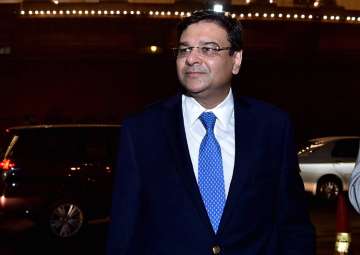RBI still counting notes deposited after demonetisation, Urjit Patel tells Parliamentary panel
RBI Governor Urjit Patel today refused to give the amount of demonetised notes deposited with banks saying they are still being counted.

Reserve Bank of India Governor Urjit Patel once again refused to give the amount of demonetised notes deposited with banks after Centre's note ban last year saying they are still being counted. The RBI Governor appeared before a Parliamentary panel for the second time where he is understood to have conveyed that the process to count junked note is still on. During the more than three-hour long meeting of the Standing Committee on Finance, Patel took a lot of questions but members, who did not want to be named, said he did not provide any "specific number" on the amount of money that came back to the system post-demonetisation on November 8, 2017.
The Committee is chaired by senior Congress leader M Veerappa Moily.
Patel's inability to provide specific answer on deposits of Rs 500 and Rs 1000 notes, eight months after the drive began, did not go down well with many members of the panel who were reported to have expressed dissatisfaction with his replies.
Moily said the Committee will present its report on demonetisation in the Monsoon Session of Parliament and that the RBI Governor will not be called again on the note ban issue. The session is scheduled to start on July 17 and is expected to conclude on August 11.
"We had a lengthy discussion (on demonetisation and various other issues) today... The panel will not be calling RBI Governor again on the issue of demonetisation," Moily told PTI.
This was Patel's second appearance before the panel after cancellation of old Rs 500 and 1,000 currency notes on November 8 -- a government decision which had attracted a lot of criticism from the Opposition.
In January too, the RBI governor had appeared before the committee and had told the members that he would submit a statement on the amount of money that came back into the system after demonetisation.
Along with Patel, RBI Deputy Governor S S Mundra was also present at today's meeting.
‘RBI has cut staff holidays to count junked notes’
Patel said employees are working "round the clock" except on Sundays. He said counting of cancelled Rs 500 and Rs 1,000 currency notes goes on continuously for six days a week. The RBI chief informed the members that the central bank has curtailed holidays for its employees for counting of the junked notes.
Except Sundays, the counting is continuously going on "round the clock" six days a week, a member of the panel quoted Patel as saying. There are more than 15,000 staff at the RBI.
According to members PTI spoke to, the central bank governor informed the panel that besides Saturdays, many other holidays have also been suspended in order to complete the mammoth task. The RBI has also issued tenders for new machines for counting of the notes, Patel told the committee.
‘Will RBI be able to provide figures by next LS elections?’
The panel's meeting lasted for more than three hours and was attended by former Prime Minister Manmohan Singh, among others.
During the course of meeting, when members from opposition parties tried to grill the governor, Moily and BJP MP Nishikant Dubey intervened.
One Congress member even asked whether RBI would be able to provide details of the amount of cash deposited post- demonetisation by May 2019, the time by when the tenure of the current regime ends.
Manmohan Singh did not ask any question to the governor, according to three panel members. Interestingly, it was Singh who had rescued Patel from a tough grilling during the January meeting when he intervened to say that the central bank and the governor's position as an institution should be respected.
Other questions asked at the meeting
Patel also parried a question on Wednesday at a meeting of the Parliamentary Standing Committee on Finance on the names of 12 industrialists whose outstanding loans amounted to 25 per cent of the Non-Performing Assets in the banking system.
Samajwadi Party member Naresh Agrawal staged a brief walk out from the meeting after not being satisfied with the response to his questions.
He is understood to have demanded the names of 12 industrialists whose outstanding loans amounted to 25 per cent of the Non-Performing Assets in the banking system.
Members also asked questions about the vigil being maintained over the use of bitcoins.
Issues relating to GDP growth and progress towards digital economy also figured in the meeting.
Members are learnt to have asked about transaction cost being levied on digital payments and inadequate presence of banks in rural areas.
(With PTI inputs)